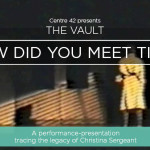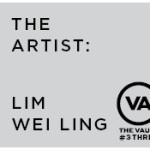Looking through his body of works, you would think Chong Tze Chien has a morbid fascination with death. Indeed, he once admitted that death was a “pet theme” (Business Times [BT], 24 April 2009) that would re-emerge time and time again in his writing.
Here are a few examples: Chong’s hugely-successful debut play, Pan-Island Expressway [PIE], staged by TheatreWorks in 1999, is a multi-layered narrative revolving around a fatal traffic accident and a suicide. Spoilt (2001), written and staged while he was a full-time playwright with The Necessary Stage, follows a woman’s journey through mental instability, concluding in her suicide.
The critically-acclaimed, emotionally-charged Poop (2010), produced by puppetry company The Finger Players, explored death and loss from a child’s perspective. Charged (2010), which Chong wrote for Malay theatre company Teater Ekamatra, follows the investigations surrounding the deaths of a Malay and Chinese soldier in an army camp. The Book of Living and Dying (2012) was inspired by The Tibetan Book of Living and Dying by Sogyal Rinpoche and follows a transvestite coming to terms with her own impending death.
Look up Chong in the newspaper archives and it would seem the motif of death has certainly served the playwright well – his name is often attached to the adjective “award-winning”. Theatre academic Dr. K.K. Seet even pronounced Chong “one of the most critically lauded and garlanded thespians of his generation” (Four Plays, p. xi).
Chong won the Singapore Dramatist Award in the Amateur Category in 1998 for PIE. Dr. Seet revealed that the judges had thought PIE was “a far superior work – in what was an unprecedented phenomenon – to the awardee in the Open Category” (PIE to Spoilt, p.10). At its 1999 production, director Casey Lim pronounced Chong to be “in the same mould as Arthur Miller and Kuo Pao Kun” (Straits Times [ST], 27 April 1999).
On Poop, BT theatre reviewer Natalie Koh had nothing but high praise for Chong:
It is a dark play that doesn’t emphasise plot progression but rather, dives deep into the souls of the characters to describe their pain of losing a loved one and the agony of knowing that another tragedy is looming.Playwright and director Chong Tze Chien creates characters so realistic and a script that rings so true that the play seems to stay with the audience long after the performance. He has created an abstract piece of work where the characters hardly speak to one another but more to the audience. Source: Moving play on suicide draws sniffles by Natalie Koh. In BT (10 Sep 2010).
Chong is also a regular fixture at the annual Life! Theatre Awards, often earning nominations in multiple categories. Charged won him Best Script in 2011 and had two sold-out runs.
Chong’s script [for Charged] is explosive and volatile yet sensitive and nuanced, not only in the way it deals with race but also with other topics such as family, class and meritocracy.Source: Paid in full by Kenneth Kwok. In The Flying Inkpot (18 Dec 2010), http://tinyurl.com/netyr7k
Charged pulls no punches with its strong (and sometimes politically incorrect) language as it takes a brutally honest look at ethnicity and religion in Singapore… It’s rare for local plays to be re-staged and it’s a pity no more tickets are available for the remaining shows. Teater Ekamatra (and anyone who misses it) should be guilty as Charged if this doesn’t return for a third run.Source: Charged pulls in the crowds by Dylan Tan. In BT (5 Aug 2011)
However, to pin down Chong as a one-trick pony with an obsession with the macabre would be wildly inaccurate and unfair. His explorations death are often only one side of the story. In discussing death, one cannot avoid its counterpart – life.
Perhaps this is why Chong said: “I would love to retire in three years’ time and die at 40. I think life is not about quantity but quality. And death to me, in that way, is a sort of release.”Source: The voyeur playwright by David Chew. In Today (28 Mar 2005).
After my fifth play, people pointed out how my characters always die at one point or another. I wasn’t conscious of the fact. For me, there’s something very serene about death. My attitude towards death-as-a-fact-of-life has always been one that gives me peace of mind.Source: Sweet Release by Mayo Martin. In Today (30 Aug 2010).
Indeed, Chong’s fascination seems to be with characters and their lives, in which death is but a single, unavoidable facet of their mortality. On Spoilt, Flying Inkpot reviewer Musa Fazal said Chong’s understanding of the human condition was “incredibly perceptive” (5 Dec 2001). Introducing a published collection Chong’s plays, Dr. Seet noted that while death is a common thread in the collection, it becomes of focal point around which a deeper exploration of humanity can take place:
Primarily, the dramatic arc in all these plays lies retrospectively, such that the plays examine the aftermath of a life-changing, character-altering event… Lest Chong be accused of possessing an agenda that is essentially jenseitig (privileging the other side of the grave), he should instead be read as expressing the dialectical relationship between two cultural paradigms… the culture of passion versus the culture of reason.”Source: Lives of quiet desperation: Chong Tze Chien and the petit recit by Dr. K. K. Seet. In Chong Tze Chien: Four plays (pp. xi-xvii).
In a way, Chong’s interest in the course of life lends itself well to historical research. In Rant & Rave (2012), a research-intensive docudrama commissioned for the Esplanade’s 10th anniversary, Chong trawled through newspaper archives for reviews and features on Singapore theatre dating back to the 1960s. With the material, he cobbled together a play which traced the history of Singapore theatre. Rant & Rave was performed by Janice Koh and Siti Khalijah, who assumed multiple personalities in the theatre industry throughout the play’s chronological trajectory.
Rant & Rave turns out to be a remarkably clear-eyed look at the theatre scene as a whole. It is, no doubt, a whirlwind summary of events and topics, but it also does its best to be objective about how critical and social discourse works in Singapore…Yet no matter how much The Straits Times has been and continues to be bedevilled in the eyes and words of many theatre practitioners, Chong quietly and diplomatically concludes that the Singapore media, whether loved or hated, is still the medium of record for all these tribulations and triumphs…
In the end, above all the ranting and raving, this play is a timely reminder that we need to remember where we have come from, and what has shaped who we are today…Source: Media-savvy theatre through the years by Corrie Tan. In The Straits Times (16 Oct 2012).
While NBC [National Broadway Company] celebrates the past in dazzling fashion and Casting Back casts a sardonic eye on it, Rant & Rave objectively takes stock of all our major highs and lows, our triumphs and tragedies, from Emily of Emerald Hill’s stage breakthrough to the government’s blanket ban of performance art.The play shows that we have come some way, but we are still a long way from having the arts scene we want; we are learning from our mistakes, albeit very slowly.
As a work of theatre, Rant & Rave may be less flashy, glib and entertaining than the other two. But as a work of tribute and remembering, it is priceless.Source: Theatre looks back by Helmi Yusof. In The Straits Times (19 Oct 2012).
But perhaps Chong’s preoccupation with people’s lives is best summed up in his voyeuristic pastime of spying on his neighbours with binoculars:
I love the juxtaposition of families next to each other. It’s a collage, each flat with different lights, different characters in each house. This is real life to me…Source: The voyeur playwright by David Chew. In Today (28 Mar 2005).
^Back to top

Chong Tze Chien has been the company director of The Finger Players since 2004. He was formerly a company playwright with The Necessary Stage. (Credit: 50 Years of Theatre Memories)
Selected Plays
*Artefacts from past stagings of Chong Tze Chien’s plays are available in The Repository. Artefacts to selected plays have been linked below.
2012 – The Book of Living and Dying
2012 – Rant & Rave
2011 – Turn by Turn We Turn
2010 – Charged
2010 – Poop
2005 – Between the Devil and the Deep Blue Sea
2004 – Furthest North, Deepest South
2001 – Spoilt
2000 – Is This Our Stop?
1999 – Lift My Mind
1999 – PIE
Browsing copies of Chong Tze Chien’s plays are also available in the Book Den.
By Daniel Teo
Published on 30 November 2015
The Vault: How Did You Meet Tina? revisits the practice and legacy of late theatre practitioner Christina Sergeant (1955-2013) through archival footage and images as well as recreated interviews with her collaborators, friends, family and students. Created and directed by Chong Tze Chien and performed by Nora Samosir, Serene Chen and Tan Shou Chen, on 5 December 2015, 8pm at Centre 42 Black Box. Admission is free. Find out more here.






